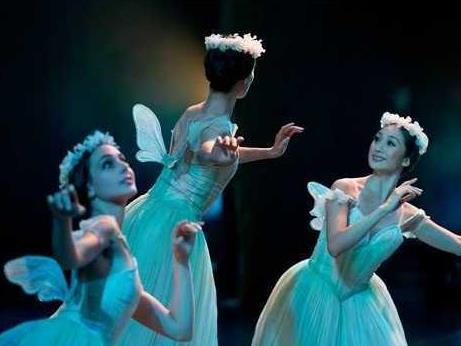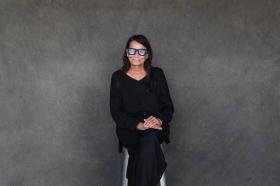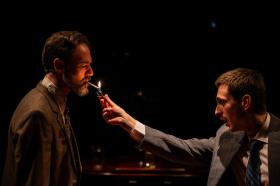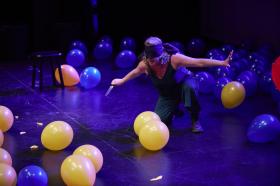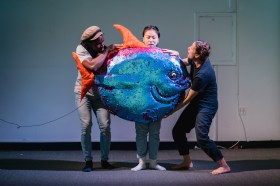The main work is a revival of the Bournonville/Bruhn ‘La Sylphide’, the iconic Romantic ballet which was given a dazzling performance. It tells the story of a Scottish farmer who falls in love with a Sylph – a woodland sprite.
Ty King -Wall was magnificent as James, the man caught between two women and worlds. His elevation and batterie were superb and he was sensational in his showy solos. He seemed genuinely in love with his fiancée Effie but is driven slightly mad in his search for the elusive Sylph (the ideal, unobtainable woman) and loses everything in the end.
The mysterious Sylph, the epitome of Romanticism, was exquisitely danced by Lana Jones. Generally she was fluttering and teasing, seemingly as light as thistledown, delicate and otherworldly, ghostlike and mysterious, with soft big ballon and a regal line in arabesque penchee. A powerful, magnificent performance that showed the precise batterie, fragile rounded delicacy of the upper body, an emphasis on the upward trajectory in jumps, the softest of landings and clear mime as demanded by Bournonville. The ensemble of sylphs in Act 2 was beautifully presented and you can see the hints of ‘Giselle’ to come in the fine unison work. Some of the poses looked straight out of the original lithographs.
Gurn his cousin was terrifically danced by Brett Simon and Effie his fiancée enchantingly danced by Natasha Kusen. Tall Matthew Donnelly played the witch Madge and I was perhaps a little disappointed. For me, he gave a quite satisfactory performance but it was rather two dimensional, played for laughs and not scary.
The ensemble was terrific in the huge displays of showy Scottish celebratory dancing in Act 1 (lots of plaids and tartan everywhere).
Which brings us to ‘Paquita’, or rather the distillation of the wedding celebrations act from this Petipa ballet, which opens the programme. It is a shining example of the traditional 19th century Russian ballet (1881) and superbly danced. Technically it was well done but the choreography at certain points was very obviously repetitive. There was a feel of it being almost neo-classical abstract dance – you could see how it influenced Balanchine for example – as for this extended divertissement there was no real plot or narrative as such, just ‘dance’ as spectacle, a diamond bright illustration of the form.
There was extremely simple staging, with two huge chandeliers against a starry backdrop and some black tabs. Hugh Coleman’s heavily detailed lavish costumes were in mustard yellow and black except for the ‘bridal couple’ in white. Particular mention needs to be made of Laura Tong in the first solo with harp and flute in a mesmerising, hypnotic display. The two leads ( in this performance Daniel Gaudello and Leanne Stojmenov) were excellent and in the showy male solos you could see how this work prefigured the later ‘Swan Lake’ and ‘Sleeping Beauty’. Stojmenov was toothily regal and coolly elegant, an enchanting princess.
The Australian Opera and Ballet Orchestra under the dynamic leadership of guest maestro Paul Murphy (from the Birmingham Royal Ballet) was tremendous. From the very first darkly dramatic notes we were in a mysterious other world and the Lovenskjold score was shaped delightfully.
A most impressive performance, a wonderful glimpse of a major Romantic ballet superbly danced
4 stars
8 November 2013
Running time – 2 & ½ hours (approx) two intervals
The Australian Ballet’s La Sylphide and Paquita runs at the Opera House until November 25
